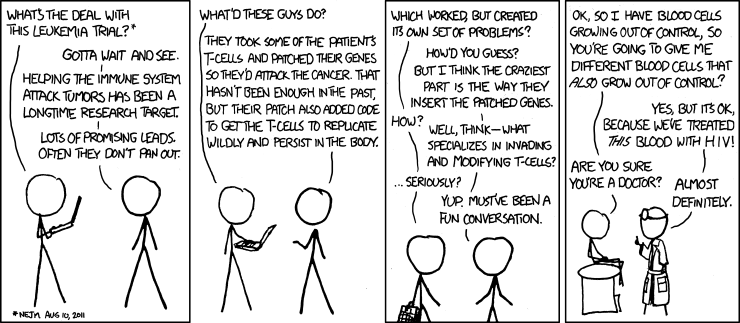The results were extremely positive, with 2 of the 3 patients having undetectable levels of cancer after a follow up at 6 months. That is, in a very limited sense, they had been cured of Cancer.
As usual with important scientific matters the best place to go for an informed view on the subject is comedy, and xkcd hit the nail on the head with a perfect mixture of optimism and scepticism in this comic.
 |
| http://xkcd.com/938/ |
From a medical genetics point of view, retroviruses like HIV include a viral enzyme called reverse-transcriptase (RT) of which the function is to incorporate the viral nucleic acid into the genome of the host cell, hence not only does the virus make copies of itself using your own cells, any daughter cells of the original also have copies of the viral genome installed and running.
Very cheeky indeed!
The treatment (nice video from UPenn team here) involves infusing back into patients modified versions of their own T-cells, that have been tinkered with by using the HIV RT enzyme to make the T-cells recognise and attack cancerous cells. However crucially, the modified T-cell genome remains persistent in the host and goes on killing cancer cells beyond the death of original infusion. (see xkcd for a succinct review of the risks and side-effects).
Given the theoretical importance of this type of treatment, I think its worth mentioning how the 3 patient trial was funded:
"The researchers did manage to get a grant from the Alliance for Cancer Gene Therapy, a charity founded by Barbara and Edward Netter after their daughter-in-law died of cancer. The money was enough to finance the trials on the first three patients."
Anyway... so during a conversation about cancer and clinical trials a few days ago I was trying to make the case that despite the cost of phase IV trials being bonkers money, and getting more expensive each year, that there is a productive area for relatively small scale charitable funding which if successful can leverage up to big-pharma funding.
However when I tried to reference a couple of the "facts" that I had used in my claim, it turns out that my memory had served me poorly and I needed to revisit my sources. It becomes clear why my poor memory is an asset if you read on...
(These mis-remembering fuckups suggest I might do well to enlist on some early stage treatment for memory loss ASAP, or pay more attention the first time... whatever ;-)
The 2 things that I mis-remembered were as follows.
1) That the report was a result and the trial was finished.
Wrong! Apparently the clinical trial is still ongoing and recruiting participants, the entry on the clinicaltrials.gov site indicates the plan is to treat 10 Lymphoma or Leukaemia patients with chimeric antigen receptor-modified T-Cells.
Though given the publicity around the previous results, much like the UK Olympics, if you don't know where your ticket is by now, you are probably not getting in.
So hopefully more of the same in future for 7 patients.
2) That the University of Pennsylvania had received a grant of 20 million dollars to fund further research.
Wrong! It turns out that I had confused the recipient of another grant with the UPenn programme.
After wasting a bit of time trying to track down this non-existing investment, I decided to send an email to UPenns medical school press office to see what follow up investment had resulted from the Redirecting T Cells report.
Here is my email to UPenn Med school press office:
Hi,
Do you have an estimate or any details of follow-up investment as result of the successful result reported in "Redirecting T Cells" and mentioned here;
I am interested to make the case that relatively modest initial investments/donations can leverage up to large institutional investments for follow up work. But I don't see any obvious quantification of the follow up investments, or subsequent projects.
Many Thanks
Tom Hodder
--
MSc Student in Medicinal Chemistry
Open University
And I received the following reply from Dr Carl June himself:
Dear Mr Hodder,
We are nearing end of negotiations with the pharmaceutical industry who will license the technology that we developed from philanthropy. We expect the announcement of the arrangement this summer in late July or early August. You will see that it is a substantial leveraging.
Carl June
Here is a video of Dr June talking about how these successes are the result of 20 years of research, and more information on the programme and research institute are available here.
So I think that is good news, and it looks like we will have wait and see what is next for this particular cure for cancer.
Notes
Chronic lymphocytic leukemia is regarded (CLL, wikipedia) to be the most common type of leukemia
http://www.nejm.org/doi/full/10.1056/NEJMe1106965
Cancer treatment can be tricky. Some measures work miraculously as the body responds in a positive way. However, there are also methods that may not be effective. Alternative methods are worth looking into when trying to find an ideal alternative cancer treatments.
ReplyDelete